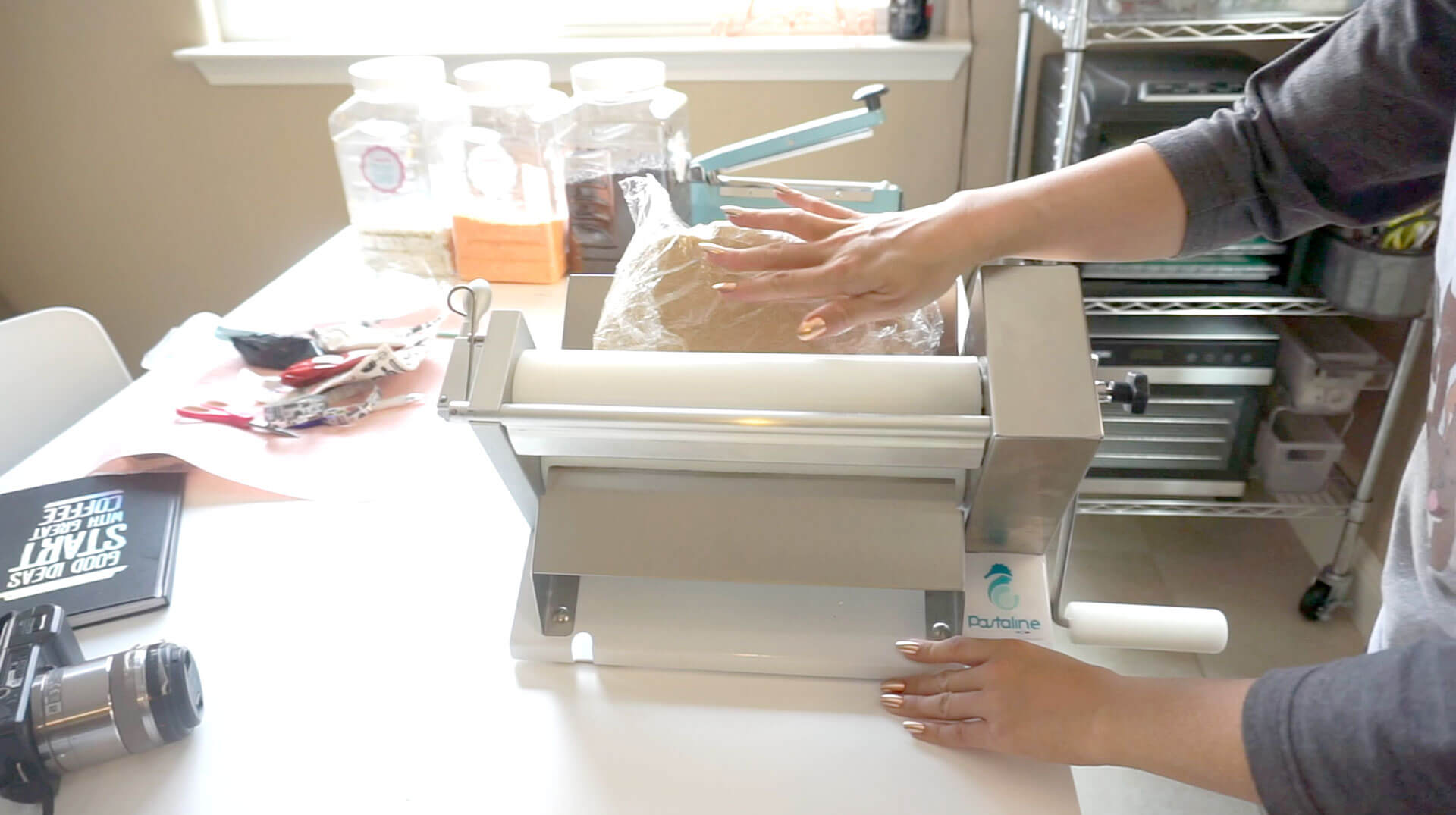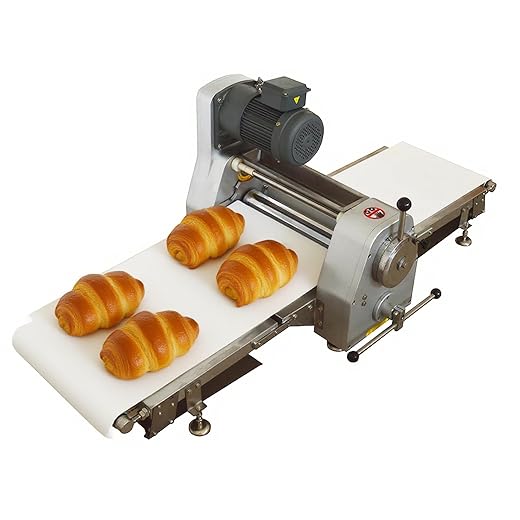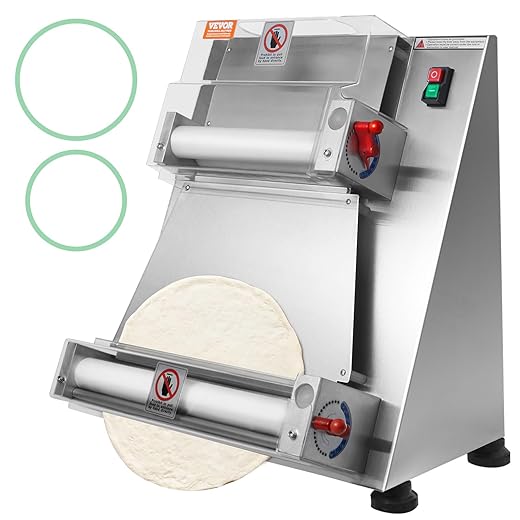⚡ Quick Introduce In 2026, home coffee habits continue to...
Read More
A dough sheeter is a machine that is used to roll out dough for various applications in baking and cooking. It is a tool that allows for the efficient and consistent rolling of dough, reducing the time and effort required to achieve the desired thickness and shape.
Dough sheeters are commonly used in bakeries, pizzerias, and other food establishments that require large quantities of dough to be rolled out quickly and evenly. They come in a variety of sizes and configurations, from small countertop models to large floor-standing machines, and are an important tool for any professional baker or pastry chef.









What is a dough sheeter used for?
A dough sheeter is a machine used to roll out large quantities of dough quickly and efficiently. It is commonly used in commercial bakeries, pizza shops, and other food establishments that require large amounts of dough to be rolled out on a regular basis.
Dough sheeters are used to create a uniform thickness and shape of the dough, making it easier to work with and ensuring consistent baking results. They can be used to roll out a variety of dough types, including pizza dough, pastry dough, bread dough, and more.
In addition to rolling out dough, some dough sheeters also have the capability to laminate dough, cut dough into various shapes, and create different textures on the dough surface.
Overall, a dough sheeter is a versatile and essential piece of equipment for any commercial bakery or food establishment that requires large quantities of dough to be rolled out quickly and efficiently.
What are the different types of dough sheeters?
There are several different types of dough sheeters available on the market, each designed for specific applications. Here are some of the most common types:
- Manual Dough Sheeters: These machines are operated by hand and require physical effort to roll out the dough. They are typically smaller and less expensive than motorized models.
- Floor Standing Dough Sheeters: These machines are larger and more powerful, and are designed for commercial use. They can roll out large quantities of dough quickly and efficiently, making them ideal for bakeries and other food establishments.
- Countertop Dough Sheeters: These machines are designed for smaller operations and can be easily placed on a table or countertop. They are more compact than floor-standing models, but still offer efficient rolling capabilities.
- Reversible Dough Sheeters: These machines are designed to roll out dough in both directions, making them ideal for large batches of dough. They are often used in industrial bakeries and food processing facilities.
- Combination Dough Sheeters: These machines can be used for a variety of tasks, including rolling out dough, laminating dough, and cutting dough into various shapes. They are versatile and offer a range of functions for commercial bakeries.
Overall, the type of dough sheeter you choose will depend on your specific needs and the volume of dough you need to roll out. Consider the factors mentioned above when choosing the best type of dough sheeter for your operation.
Why do you use a dough sheeter?
There are several reasons why you might use a dough sheeter instead of rolling out dough by hand. Here are a few:
- Efficiency: A dough sheeter can roll out large quantities of dough quickly and consistently, allowing you to produce more baked goods in less time. This is especially important in commercial baking operations where time is of the essence.
- Consistency: When you roll out dough by hand, it can be difficult to achieve a consistent thickness throughout the dough. With a dough sheeter, you can set the thickness to your desired level and roll out the dough evenly every time.
- Ease of use: Rolling out dough by hand can be tiring and time-consuming, especially if you have a lot of dough to work with. A dough sheeter eliminates the need for manual labor and makes the process of rolling out dough much easier and more efficient.
- Precision: Dough sheeters allow for precise control over the thickness of the dough, which can be important for certain types of baked goods that require a specific thickness.
Overall, a dough sheeter is a valuable tool for any professional baker or chef who needs to roll out large quantities of dough quickly and efficiently while maintaining consistency and precision.
What is the difference between a dough roller and a dough sheeter?
The terms “dough roller” and “dough sheeter” are often used interchangeably, but there are some subtle differences between the two.
A dough roller is a manual or electric tool that is used to roll out dough by hand. It typically consists of a cylindrical roller that is used to flatten the dough to a desired thickness. Dough rollers are often smaller and less expensive than dough sheeters, and they are usually used for smaller batches of dough.
A dough sheeter, on the other hand, is a larger and more complex machine that is designed to handle large quantities of dough. It consists of a set of rollers that are powered by an electric motor, allowing for the efficient and consistent rolling of dough. Dough sheeters are often used in commercial bakeries, pizzerias, and other food establishments that require a large volume of dough to be rolled out quickly and evenly.
Overall, the main difference between a dough roller and a dough sheeter is their size and capacity. Dough rollers are smaller and more suited to smaller batches of dough, while dough sheeters are larger and more suitable for commercial or industrial applications.
How do I choose a dough sheeter?
When choosing a dough sheeter, there are several factors to consider to ensure that you select the best machine for your needs. Here are a few things to keep in mind:
- Capacity: Consider how much dough you need to roll out at a time, and choose a machine that can handle that amount. If you are running a small bakery or pizzeria, a smaller machine may be sufficient, but for larger operations, you will need a machine with a higher capacity.
- Size: Dough sheeters come in various sizes, from small countertop models to large floor-standing machines. Choose a machine that fits your available space and can be easily moved or stored as needed.
- Features: Some dough sheeters come with additional features such as adjustable rollers, safety guards, and easy-to-clean surfaces. Consider which features are important to you and choose a machine that meets your needs.
- Motor power: The power of the motor can affect how quickly and efficiently the machine can roll out dough. If you plan on using the dough sheeter frequently or for large batches of dough, choose a machine with a higher-powered motor.
- Price: Dough sheeters can vary widely in price, so consider your budget when choosing a machine. Keep in mind that a higher-priced machine may offer more features, better durability, and higher quality construction.
Overall, it’s important to choose a dough sheeter that fits your specific needs and budget. Consider the factors above and do your research to find the best machine for your bakery or kitchen.
How to use dough sheeter
Using a dough sheeter can be a bit intimidating at first, but with practice, it becomes an easy and efficient way to roll out dough. Here are the general steps to follow when using a dough sheeter:
- Prepare your dough: Before using the dough sheeter, make sure your dough is properly prepared and ready to be rolled out. It should be at the right consistency and temperature, and free of any air pockets.
- Set up the machine: Adjust the rollers on the dough sheeter to the desired thickness. This can be done using the knobs or levers on the machine. Most machines will have a gauge or dial to help you set the thickness.
- Start rolling: Feed the dough through the rollers, making sure to keep it centered and straight. If the dough is too long, cut it in half or thirds and roll it through one piece at a time. Keep adjusting the rollers to gradually reduce the thickness of the dough until it reaches the desired thickness.
- Repeat as needed: Depending on the type of dough you are working with and the desired outcome, you may need to roll the dough through the sheeter several times, gradually reducing the thickness each time.
- Cut the dough: Once the dough is rolled out to the desired thickness, use a cutter or other tool to cut it into the desired shapes.
- Clean up: After using the dough sheeter, make sure to clean it thoroughly and store it properly to ensure it lasts a long time.
Remember to always follow the manufacturer’s instructions for your specific dough sheeter, as the process may vary slightly depending on the machine. It’s also important to be cautious and follow safety guidelines when using a dough sheeter, as it can be dangerous if not used properly.
How to clean dough sheeter
Cleaning a dough sheeter is important to ensure that it remains in good working condition and produces high-quality dough. Here are the general steps for cleaning a dough sheeter:
- Turn off the machine: Before cleaning the dough sheeter, make sure it is turned off and unplugged from the power source.
- Remove any excess dough: Use a scraper or spatula to remove any excess dough or debris from the rollers and other surfaces of the machine.
- Clean with a brush: Use a soft-bristled brush to sweep away any remaining dough or debris from the rollers and other surfaces. Be sure to remove any dough that may have gotten stuck in the crevices of the machine.
- Wipe down with a damp cloth: Use a damp cloth to wipe down the rollers and other surfaces of the machine. Avoid using too much water, as this can damage the machine.
- Sanitize with a cleaning solution: Use a cleaning solution that is safe for use on food equipment to sanitize the machine. Be sure to follow the manufacturer’s instructions for the cleaning solution.
- Dry thoroughly: Use a clean, dry cloth to wipe down the machine and remove any excess moisture. Make sure the machine is completely dry before using it again.
Remember to always follow the manufacturer’s instructions for cleaning and maintaining your specific dough sheeter, as the process may vary slightly depending on the machine. It’s also important to clean the dough sheeter on a regular basis to ensure that it remains in good working condition and produces high-quality dough.
How to maintain dough sheeter properly
Proper maintenance is key to ensuring that your dough sheeter lasts a long time and performs at its best. Here are some tips for maintaining your dough sheeter:
- Keep it clean: Regularly clean your dough sheeter using the steps outlined in the previous answer. This will prevent the buildup of dough and debris, which can damage the machine and affect the quality of the dough.
- Lubricate the moving parts: Check the manufacturer’s instructions for your specific dough sheeter, but many machines require regular lubrication of the moving parts to ensure smooth operation.
- Check the belts and rollers: Inspect the belts and rollers regularly to make sure they are in good condition and properly aligned. Any damage or misalignment should be repaired immediately to prevent further damage to the machine.
- Use the machine correctly: Follow the manufacturer’s instructions for using the dough sheeter, and avoid overloading it or using it for tasks it wasn’t designed for.
- Store it properly: When not in use, store your dough sheeter in a clean, dry place that is protected from dust and debris.
- Schedule regular maintenance: Consider scheduling regular maintenance with a professional to ensure that your dough sheeter is operating at its best.
By following these tips, you can keep your dough sheeter in great condition and ensure that it produces high-quality dough for years to come.
Troubleshooting about dough sheeter
Here are some common issues that can occur when using a dough sheeter, along with possible solutions:
- Uneven dough thickness: If your dough is not coming out evenly, check to make sure that the rollers are properly aligned and that the dough is being fed through the machine evenly. Adjust the rollers as needed and ensure that the dough is being fed through at a consistent pace.
- Dough tearing or sticking to the rollers: If your dough is tearing or sticking to the rollers, it may be too dry or too moist. Adjust the amount of flour or water in your dough recipe as needed, and use a light dusting of flour on the rollers to prevent sticking.
- Machine jamming: If your machine becomes jammed, stop the machine immediately and turn it off. Carefully remove any trapped dough or debris from the machine, and clean the rollers and belts thoroughly before restarting.
- Noise or vibration: If your machine is making unusual noises or vibrations, it may indicate that the belts or rollers are loose or damaged. Turn off the machine and inspect the belts and rollers, making any necessary adjustments or repairs.
If you encounter any other issues with your dough sheeter, consult the manufacturer’s instructions or contact a professional for assistance.
Conclusion
Whether or not you should buy a dough sheeter depends on your specific needs and circumstances. If you regularly work with large quantities of dough, a dough sheeter can save you time and effort compared to rolling out the dough by hand. It can also help you achieve a more consistent and uniform dough thickness, which can be important for certain baked goods.
However, dough sheeters can be quite expensive, and may not be necessary for home bakers or those who only work with small amounts of dough. They also take up a significant amount of space, so you will need to have a dedicated area for the machine.
Before purchasing a dough sheeter, consider how often you will use it, the amount of dough you typically work with, and your available budget and space. If a dough sheeter seems like a good investment for your baking needs, be sure to do your research and choose a model that meets your specific requirements.
Related Posts
🔥 Amazon Black Friday 2025 Mega Sale — The Biggest Deals of the Year Are LIVE!
Save Up to 70% on Top Products Across Home, Kitchen,...
Read More🌀 Waste Maid 10-US-WM-058-3B Garbage Disposal Review – Small Size, Big Power for Modern Kitchens
🌟 Quick Introduce If you’ve ever wished for a cleaner,...
Read MoreWhy Trust Us
You will find what you are looking for at Jody's Bakery. From classic to luxury brands, you'll find both. We will help you to select appliances that fit your needs, budget and lifestyle. Whether you want to stop by to learn more — or plan to make a major purchase — we’ll treat you like family and assist you every step of the way. Shop with us today to receive friendly and experienced help along the way.






Very insightful article! Its great to see such well-researched content. Lets talk more about this. Check out my profile!